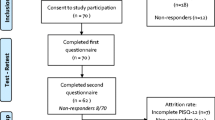Abstract
Introduction
A simple quality of life questionnaire was designed to triage patients with faecal incontinence to the most appropriate level of support, investigation and treatment.
Method
A questionnaire was developed to include a ‘symptom’ score, similar in content to St Mark’s questionnaire and a ‘bothersome’ score. A pilot study (34 patients) assessed the clarity of questions. Once content validity was established, it was sent to 360 patients who attended a pelvic floor clinic. Its external validity was assessed against the established standards of the short form 36 (SF-36) and the Manchester Health Questionnaires. Ease of use for these was assessed using a separate form.
Results
Of the 360 patients, 86 replied. The questionnaire was shown to be reliable both by measurement of its internal consistency and by test-retest analysis. There was a significant correlation between the scores of the new questionnaire and the Manchester Health Questionnaire as well as the SF-36. Divergence validity, assessed by correlating the number of pads used and the overall symptom score, was established. The new questionnaire was easiest to complete, taking on average 4 min.
Conclusion
We have demonstrated that the new questionnaire is reliable and valid. It is easy and quick to complete and assesses both severity and impact of symptoms.

Similar content being viewed by others
References
Nelson R, Norton N, Cautley E, Furner S (1995) Community-based prevalence of anal incontinence. JAMA 274:559–61
Donovan J, Bosch R, Gotoh M, Jackson S (2005) Symptom and quality of life assessment. JAMA 294:2697–8
Anronson NK (1989) Quality of life assessment in clinical trails: methodologic issues. Control Clin Trials 10:s195–s208
Bug GJ, Kiff ES, Hosker G (2001) A new condition specific health related quality of life questionnaire for the assessment of women with anal incontinence. BJOG 108:1057–67
Rockwood TH, Church JM, Fleshman JW, Kane RL, Mavrantonis C, Thorson AG, Wexner SD, Bliss D, Lowry AC (2000) Fecal incontinence quality of life scale: quality of life instrument for patients with fecal incontinence. Dis Colon Rectum 43:9–16
Hiller L, Radley S (2002) Development and validation of a questionnaire for the assessment of bowel and lower urinary tract symptoms in women. BJOG 109:413–23
Vaizey CJ, Carapeti E, Cahill JA, Kamm MA (1999) Prospective comparison of faecal incontinence grading systems. Gut 44:77–80
Rockwood TH, Church JM, Fleshman JW, Kane RL, Mavrantonis C, Thorson AG, Wexner SD, Bliss D, Lowry AC (1999) Patient and surgeon ranking of the severity of symptoms associated with fecal incontinence: the fecal incontinence severity index. Dis Colon Rectum 42(12):1525–32
Nunnally JC (1978) Psychometric theory. McGraw Hill, New York
Health Services Research Unit, Department of Public Health and Primary Care (1993) A quality of life measurement in health care, a review of measures and population norms for the UK-SF-36. University of Oxford, Oxford
Donovan JL, Badia X, Corcos J (2002) Symptoms and quality of life assessment. Incontinence. Health, Plymouth, pp 267–316
National Institute for Health and Clinical Excellence (2007) Faecal incontinence: the management of faecal incontinence in adults. National Institute for Health and Clinical Excellence, England
Avis NE, Smith KW (1994) Conceptual and methodological issues in selecting and developing quality of life measures. Quality of life in health care, vol 5. JAI, Greenwich
Edwards P, Roberts I, Clarke M, DiGuiseppi C, Pratap S, Wentz R, Kwan I (2002) Increasing response rates to postal questionnaires: systematic review. BMJ 324(7347):1183
Author information
Authors and Affiliations
Corresponding author
Additional information
Poster presentations: 15th Annual Scientific Meeting, UKCS, Basingstoke, April 2008; The Association of Coloproctology of Great Britain and Ireland annual meeting, Birmingham, June 2008; European Society for Surgical Research, Warsaw, May 2008; 38th Annual Meeting of International Continence Society, Cairo, Nov 2008
Rights and permissions
About this article
Cite this article
Krysa, J., Lyons, M. & Williams, A.B. A simple quality of life questionnaire for patients with faecal incontinence. Int J Colorectal Dis 24, 1213–1217 (2009). https://doi.org/10.1007/s00384-009-0769-0
Accepted:
Published:
Issue Date:
DOI: https://doi.org/10.1007/s00384-009-0769-0




